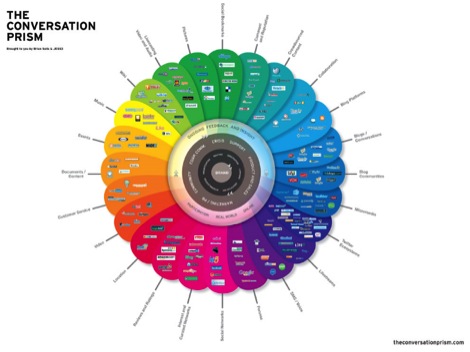You are viewing our site as an Agent, Switch Your View:
Agent | Broker Reset Filters to Default Back to ListWant to Stand Out from the Crowd? Tell Your Story.
September 16 2010
 The word “storytelling” has a warm connotation. I love the craft of bringing people along on a journey. They inspire and enlighten.
The word “storytelling” has a warm connotation. I love the craft of bringing people along on a journey. They inspire and enlighten.
Even in business? Enlightening? Really?
Sometimes it feels manipulative; sometimes it sounds like the teller is trying too much.
But from the beginning of time humans have always told stories. Now stories bombard us through a number of recent media channels. The act of telling a story has changed, the story is more important than the telling. It’s called PR.
Cathy Brooks, founder of Other Than That, head raconteur of Story Navigation and executive producter/host of Social Media  Hour, presented at the WITI Women in Technology Summit on the concept of using storytelling through modern channels to build up your client base and promote your brand.
Hour, presented at the WITI Women in Technology Summit on the concept of using storytelling through modern channels to build up your client base and promote your brand.
She said, "The nature of storytelling has changed. It’s not about the what, it’s about the who. Business today is personal and social media platforms are making it more like this."
We now tell people what we’re doing, when we’re doing it, where we’re connected, and who we are connected with. This is the game changing differentiater.
Have you ever been asked, “What do you do for a living?”
What are people really asking? Do they really care that you are a real estate professional? Maybe, but they want to know WHY you are a real estate professional. What do you love about it?
Your understanding of the motivation behind the question is what matters. Personal motivation and passion is what sets you apart from anyone else in the room/or online. Everyone is a snowflake; different from those around you.
When you are present in creating your narrative, you’re focused and involved in the story. That is what makes it compelling. Your personal stories create who you are.
Business is about persuasion.
When you’re buying a house or deciding on a REALTOR®, what is it that makes you complete a transaction? Trust and relationship.
In the real estate industry you need to know how to sell real estate, how to use technology to support your business, and why all this matters. But to stand out from the crowd you need to express a passion and an inner drive that attracts homebuyers to you specifically.
Don’t think about your work as a job, instead picture your experiences as the arrows you have in your quiver, the skills you’re amassing along the way.
Elements of a story include: context, conflict, solution, resolution.
Think of storytelling like method acting. It’s in knowing which story you should tell, and being able to mold your tone to emphasize your message.
Cathy asked the women at WITI to do a short exercise: Take a few minutes and think about the 5 senses (sight, taste, sound, touch, and smell) and what describes you in each of those categories.
This was an unqiue task. But the result was taking a moment or two to categorize yourself. My list and justification included:
- Taste = panang curry
- Sound= bird chirping
- Touch = paperback book
- Sight- standing bow yoga pose
- Smell- shea cashmere
(If you thought that was abstract, you should have heard the others.)
Think about who you are and what makes you stand out. Now take it to the next level. How do you display this online? How do you take those personal differentiators we all have and re-work it into a story and online image?
Ever heard of Marshall Ganz? He’s a great storyteller, made famous in the Civil Rights Movement. When he talked about civil rights as a general moral concept, he met the barrels of many guns (figuratively, of course). When he talked about how HE felt about civil rights personally, the guns lowered. He focused on the power of the personal story. It works in politics (i.e., Obama), sports (i.e., Michael Phelps) and other spheres of influence.

The above image, called the Conversation Prism visually captures the diversity and quantity of social platforms we use to communicate our story.
Without getting overwhelmed with the above image and take a step back and think about the overall story.
“There’s no ‘I’ in team, but there’s an ‘I’ in social media…and a ‘me,’” says Cathy.
Telling your story online and as a whole is key. But don’t ignore the pieces.
The pieces of a story make the whole. The famous cartoon of several blind men using their senses to isolate and explain a part of what they did not know to be an elephant helps to prove this point. Individually describing what they were feeling, would not have led the audience to think “elephant.” But collectively describing the body parts, an elephant became a whole.
Sharing bits and pieces about who you are is important.
Tina Sharkey, Johnson & Johnson, when asked how she keeps track of her social media image, she said she just makes sure the “Tina” online is the same everywhere. If she doesn’t something known about her, she doesn’t put it online.
Laura Fitton, founder of 140, was going through hard personal struggle with child custody and lived that online, publically. People resonated with her more because of it.
There is no one size fits all. It’s completely up to you.
Jeffery Hayzlett worked for Kodak and tweeted, blogged, posted Facebook updates all for Kodak. But he made it personal. He created an image for him, so much so when he quit Kodak he became one of the most sought-after social media speakers. He grew into his own brand.
How can you build your brand so that people will set you apart from the crowd.
Where is the line between professional and personal? I personally live my life full frontal. I do draw the line with discussing family, relationships, financial, personal health online, but the rest I am open about. Learning to address sensitive subjects is important.
What do you do if you have slanderous digital hate online? If you have done something wrong, I’m a big fan of stepping in and claiming it. Things online will always come back to haunt you. If you have not done something wrong, and are falsely accused, and if it is defamatory or hurting your business image. First step is to go to the social platform and ask them to delete it. If not, consider legal recourse.
If you want to get more information about Cathy. Go to www.CathyBrooks.com.
As real estate professionals, blogging platforms, social media platforms like Twitter, Facebook, YouTube, LinkedIn, MySpace etc., and websites all work together as parts to create the whole of your online persona and brand.
To learn more about WITI and their conferences, please click here.










